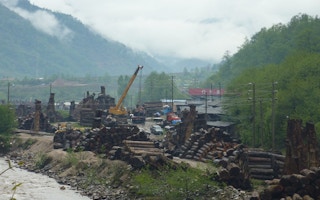A London-based environmental campaign group has called on the Myanmar and Chinese governments to take urgent action over the rampant trade of illegal timber between the borders of the two countries.
The Environmental Investigation Agency (EIA) on Thursday released a report titled, “Organised Chaos: The illicit overland timber trade between Myanmar and China”, which exposes the intricate nature of the corruption that drives a multimillion-dollar logging business in the region.
The report documents how different parties profit from the illegal trade, and where “shady Chinese businesses paying in gold bars for the rights to log entire mountains”, EIA said in a statement.
It also highlighted an unprecedented court decision in July this year which convicted 155 Chinese nationals for illegal logging and then pardoned a few days after the sentencing, putting a spotlight on the extent of the illegal logging business taking place at the border of Myanmar’s Kachin state and China’s Yunnan province.
“The massive overland trade in illicit timber between Myanmar and China is destroying vital areas of forests, threatening the livelihoods of local communities, provoking conflict and violence, and fostering corruption,” EIA noted in the report.
“
The reality beneath the apparent anarchy is an intricate and structured supply chain within which different players have defined functions and collude to ensure the logs keep flowing.
Faith Doherty, EIA forest campaign team leader
EIA dubbed the systemic illegal logging to be one of the “single largest bilateral overland flows of illegal timber in the world”.
Faith Doherty, the group’s forest campaign team leader, noted that “at first glance, this cross-border trade looks to be both chaotic and complex”, with most of the stolen timber trafficked through Myanmar’s conflict-torn Kachin State.
“But the reality beneath the apparent anarchy is an intricate and structured supply chain within which different players have defined functions and collude to ensure the logs keep flowing,” she said.
The illegal cross-border timber trade from Myanmar to China has persisted over 25 years, with waves of temporary clampdowns, but this has once again reached its peak in 2013, stated the report.
“The illicit cross-border timber trade is entirely driven by demand for comparatively low-cost raw materials in China, and abetted by local and national trade policies in China and corruption, conflict and weak rule of law in Kachin,” it noted.
EIA also found that the increasing demand for rosewood, a highly valuable species used in making luxury furniture, is now driving the trade.
From 2000-2013, about 624,000 cubic metres of rosewoods were exported to China at a worth of about US$735 million, but a third of this wood was exported in 2013 alone, the group said in a separate report in 2014.
The growing demand is threatening Burmese rosewood to extinction, the 2014 report added. This type of wood has disapperead from the forests of neigbouring Laos, Cambodia, Thailand and Vietnam.
The latest report has urged China to reform its luxury furniture industry or the ‘Hongmu’, to ensure it stops stimulating the demand and for Myanmar to enlist its rosewood species - the tamalan and padauk - on the UN Convention on International Trade in Endangered Species.
It also recommended that China put in place clear regulations that prohibit the import of illegally logged timbers while Myanmar should slow down logging operations countrywide, pending a full assessment of current forest conditions.
Myanmar’s forest loss has reached 1.15 million acres a year, with some of them the last remaining high conservation value forests in the region.
Doherty commented: “Both Myanmar and China need to take urgent and effective action to stem the torrent of illicit timber flowing across their joint border or watch conflict, violence and forest destruction continue to escalate.”
The full report can be read here.

















